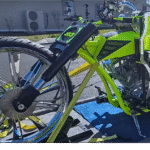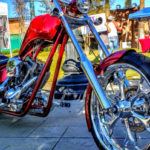Motorcycle led headlight conversion
Curtis from www.wildsteedworx.com shows how to do the LED conversion from start to finish in this easy-to-follow video.
Motorcycle led headlight conversion – this video shows how to convert the standard American Ironhorse Texas Chopper headlight bulb to the new and much more powerful LED bulb.
This is mostly an added safety feature for motorcycle riders because your bike is better seen both during the day and at night with this high output LED bulb. Naturally, the additional benefit of this LED bulb is the fact that you can see much farther at night and thereby avoid unexpected road hazards in more distance than you would have with the standard halogen bulb.
So, the benefit of doing this simple motorcycle LED headlight conversion, is that your bike be seen better by other traffic as well as letting you see much farther during the evening and thereby helping safely avoid hazards.
LED light info:
From Wikipedia, the free encyclopedia:
An LED lamp is a light-emitting diode (LED) product that is assembled into a lamp (or light bulb) for use in lighting fixtures. LED lamps have a lifespan and electrical efficiency that is several times better than incandescent lamps, and significantly better than most fluorescent lamps, with some chips able to emit more than 100 lumens per watt. The LED lamp market is projected to grow by more than twelve-fold over the next decade, from $2 billion in the beginning of 2014 to $25 billion in 2023, a compound annual growth rate (CAGR) of 25%.
Most LEDs do not emit light in all directions, and their directional characteristics affect the design of lamps, although omnidirectional lamps which radiate light over a 360° angle are becoming more common. The light output of single LED is less than that of incandescent and compact fluorescent lamps; in most applications multiple LEDs are used to form a lamp, although high-power versions (see below) are becoming available.
The Energy Independence and Security Act (EISA) of 2007 authorized the Department of Energy (DOE) to establish the Bright Tomorrow Lighting Prize competition, known as the “L Prize”, the first government-sponsored technology competition designed to challenge industry to develop replacements for 60 W incandescent lamps and PAR 38 halogen lamps. The EISA legislation established basic requirements and prize amounts for each of the two competition categories, and authorized up to $20 million in cash prizes. The competition also included the possibility for winners to obtain federal purchasing agreements, utility programs, and other incentives. In May 2008, they announced details of the competition and technical requirements for each category. Lighting products meeting the competition requirements could use just 17% of the energy used by most incandescent lamps in use today. That same year the DOE also launched the Energy Star program for solid-state lighting products. The EISA legislation also authorized an additional L Prize program for developing a new “21st Century Lamp”.
Philips Lighting ceased research on compact fluorescents in 2008 and began devoting the bulk of its research and development budget to solid-state lighting. On 24 September 2009, Philips Lighting North America became the first to submit lamps in the category to replace the standard 60 W A-19 “Edison screw fixture” light bulb, with a design based on their earlier “AmbientLED” consumer product. On 3 August 2011, DOE awarded the prize in the 60 W replacement category to a Philips’ LED lamp after 18 months of extensive testing.
View our chopper motorcycles for sale
















9 Comments
Tim · October 17, 2015 at 3:12 pm
Great informative video….THANKS for this!
L.T. · October 17, 2015 at 3:13 pm
Seems like an EZ safety upgrade.
Wes · October 17, 2015 at 3:15 pm
Never knew the the LED bulbs were brighter. Going to make this #1 winter upgrade.
Laura W · October 17, 2015 at 3:17 pm
Great idea for Holiday present for my guy
San Jose · October 17, 2015 at 3:19 pm
Ok – I’m sold Looks easy enough Thanks for showin the steps.
O.C. Rider · October 17, 2015 at 3:21 pm
Safety upgrade that also looks good Why not?
San Diego customs · October 18, 2015 at 6:10 am
I’m thinking of this for my Harley knucklehead.
Mira Mesa · October 19, 2015 at 2:38 pm
Thanks for the LED motorcycle install video – good information.
Escondido agent · October 20, 2015 at 9:47 pm
Very informative – Going to upgrade for next season.